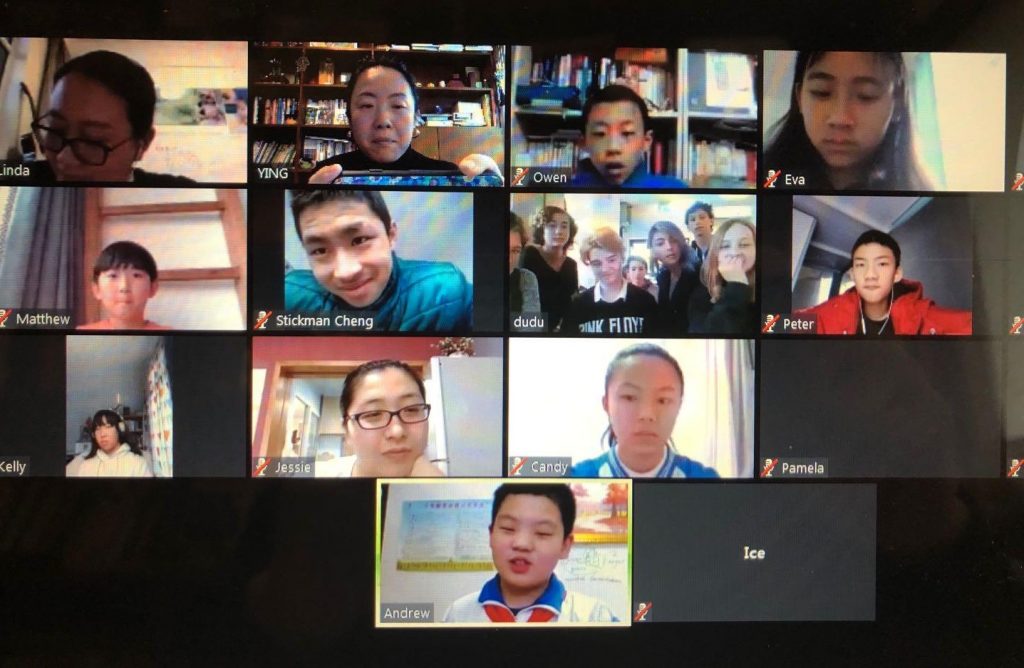An Israeli learning initiative is bringing together Chinese pupils currently confined mainly to their homes as the country tries to contain the spread of a deadly new coronavirus, and Israeli peers who are eager to engage with them for a welcome distraction and even a few math lessons.
For the past two weeks, Chinese and Israeli pupils from grades 1 to 10 have been signing in to video sessions facilitated by their educators, to speak to each other, share experiences and commentary on music and popular culture, and take part in group lessons.
Many of the Chinese participants live in areas subject to lockdown across the country as it tries to grapple with the outbreak of a new strain of coronavirus, currently known as severe acute respiratory syndrome coronavirus 2 (SARS-CoV-2). Since late December, when it became known that the city of Wuhan in Hubei province was the epicenter of the new coronavirus, authorities have restricted movement and travel for much of the province—home to over 50 million people—amid efforts to contain the spread. As of February 24, the virus has infected more than 79,000 people worldwide and killed over 2,470, a majority of them in Hubei, according to a live-updating map of the outbreak that draws figures from the World Health Organization (WHO) and other agencies.
The lockdown has meant that few venture outside their homes and kids have not been to school.
“When we saw what was happening as the virus started to spread, we started thinking about how we can help,” says Yaacov Hecht, an Israeli educator, lecturer, and a pioneer of democratic education who founded and ran Israel’s first democratic school in Hadera in the 1980s. (There are more than 30 democratic schools in Israel today and hundreds across the world.) Hecht is also the founder of Education Cities, an education organization focused on collaborations in classrooms, schools, and cities, as well as team and online learning.
Education Cities already runs an MOOC (massive open online courses) program with Chinese students and educators. The current initiative, called “Bridging with China,” grew out of this collaboration.
Hecht tells NoCamels that he and his team began reaching out to their Chinese program partners to gauge their needs and express support as events surrounding the coronavirus crisis started to unfold.
“Not only do they feel isolated, they are isolated,” he says, adding that currently, the lockdown affects some 100 million pupils in China. “They are just at home all day and many of them feel like they’ve been cast aside by the world.”
“We wanted to let them know that we are here for them, that we are with them,” Hecht says. Education Cities started putting out the word, through school principals and teachers with whom the organization works, that they were coordinating video meetings with Chinese pupils. “Once we publicized the initiative on Facebook, things really took off and hundreds of schools across Israel answered the call to help and take part,” Hecht tells NoCamels.
The video sessions are arranged via teachers in Israel, China, and other countries where Education Cities operates for “safety reasons,” says Hecht. The meetings are coordinated on WhatsApp and WeChat, a popular Chinese messaging and social media platform, and the sessions themselves take place on Zoom, a video communications platform widely used in the business world for conferencing, online meetings, and chats.
“At the moment, it’s all not very sophisticated tech, but we are using tools that every student has,” Hecht says, adding that he’s been approached by companies and organizations offering more advanced platforms and general support.
Hecht says the sessions started out with general “getting to know you” conversations such as likes and common interests, and then the pupils started sending each other videos, apps, and songs, and even played games (such as Hangman). “This week, they also began to learn together, as teachers are now initiating lessons in math and other subjects,” he explains.
In a short video showing clips of different interactions seen by NoCamels, Israeli pupils are seen expressing support for their Chinese counterparts, playing instruments and drawing pictures.
Hecht says this moment is a “huge opportunity for online learning, for bringing people together to study and learn together.”
